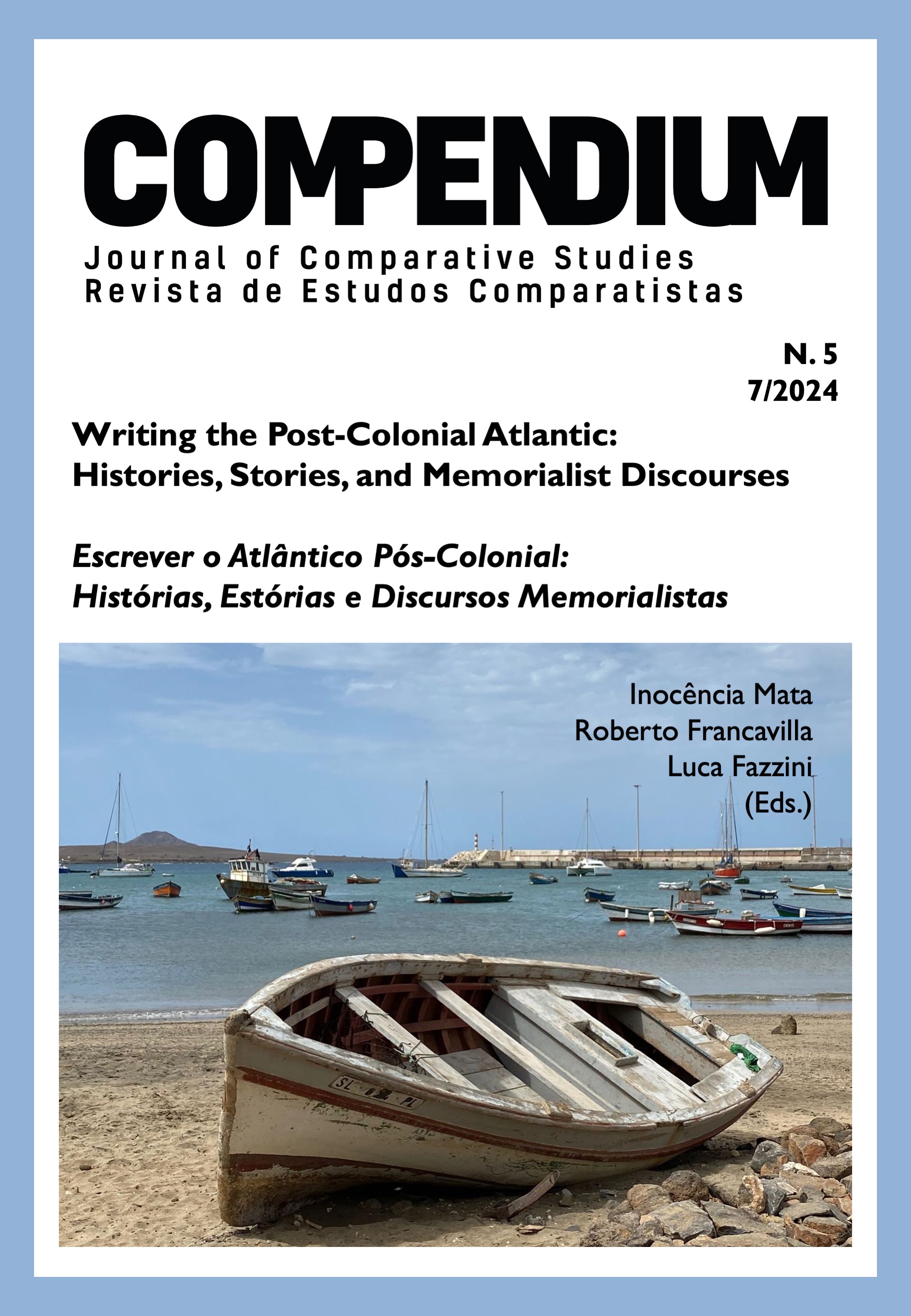Call for Papers: Compendium No. 5
NEW DEADLINE: 12 January 2024
Writing the Post-Colonial Atlantic: Histories, Stories, and Memorialist Discourses
Deadline for submissions: 12 January 2024
Editors:
Inocência Mata (University of Lisbon)
Roberto Francavilla (University of Genoa)
Luca Fazzini (University of Lisbon)
Compendium: Journal of Comparative Studies is welcoming articles for its fifth issue, Writing the Postcolonial Atlantic: histories, stories, and memorialist discourses.
This issue proposes a comparative approach to the ways of writing and thinking about the world that consider the maritime transits characterizing imperial expansionism and its post-colonial developments.
Theorists of the "Atlantic world", such as Paul Gilroy (1993) and Alberto da Costa e Silva (2003), highlight the centrality of oceanic exchanges the construction of a modern ethos, un the dynamics and hierarchies of power resulting from European expansion as well as for understanding the persistence of the imperial violence in contemporary times.
From the occupation of the Americas to the processes of effective colonization of the African continent, bodies, cultures, knowledges, techniques, and ideologies spread on both shores of the Atlantic. According to Rice University's Slave Voyages database, around 12 million individuals left the African continent enslaved for forced labor on American and European soil. At the same time, according to the various models of colonialism and the requirements of the colonial metropoles, both the American and the African spaces became the theater of immersion processes (Mbembe 2021) that, based on the violent and instrumental imposition of Western reason/civilization, reconfigured the relationship between culture, identity, and space (Hall 2003). Such movements have received new impulses and dynamics in post-imperial contemporaneity while maintaining the uneven relations between the global North and South.
If literature, from the 16th-century travel writings to the so-called (Post) Colonial Literatures (Boehmer 1998; Mata 1989, 2016; Mata & Lugarinho 2021), has witnessed the conflictual encounter with the Other, stereotyping and mythologizing Africa (Mudimbe 1988) by participating in the processes of construction of racialized difference, the postcolonial approach (Mignolo 2000; Hall 2003; Mata 2016) proposes a critical review of modern conceptions of the Other. Such critique would allow thinking about the Atlantic space from a multiplicity of perspectives, while highlighting the persistence of modern violence and hierarchies in contemporary neocolonial and endocolonial configurations. In this sense, Postcolonial literature would be an amphibious literature, insofar as it would transit simultaneously in the field of aesthetics and politics (Santiago 2000).
Mapping the stories and histories of the Atlantic, a topical space of European expansionism and the conflictual encounter with the Other, in a diachronic perspective, therefore presents itself as an opportunity to reflect on the intersections between literature and power, and on the ways of thinking the real, in literature, from the coexistence of multiple epistemologies and temporalities.
To discuss these themes, the dossier Writing the Postcolonial Atlantic: Histories, Stories and Memorialist Discourses invites researchers to submit studies on the following axes:
— Inscriptions of Atlantic transits in literature and culture;
— Ways of staging imaginaries of Empire in literature and culture;
— Memories of colonial and post-colonial travel;
— Aesthetic memorializations of racial and gender violence in literature;
— Disseminations of Atlantic history: European literatures of African descent;
— Writings from Atlantic port cities: urban space as "contact zone" and "place of memory";
— Oceanic comparisons: reading the Atlantic and the Indian Ocean comparatively.
We especially encourage submissions on topics that reach beyond Western cultures, as well as submissions from doctoral students and early-career researchers. Submitted articles may be written in English, Portuguese, Spanish, or French, and should range between 6,000 and 8,000 words, including notes, references, an abstract of 150 to 250 words, as well as 4 to 6 keywords. Authors must follow the formatting guidelines listed in the Submissions section under Author Guidelines on the journal’s website. Submissions must include a separate document containing a short biographical note of the author, up to 150 words.
Questions and expressions of interest can be sent to the editors at: luccafazzini@campus.ul.pt.
Online submission: to register and submit your article for peer review, please follow the hyperlink Make a Submission on the Compendium homepage before June 30, 2023.
References:
- Boehmer, Elleke (ed.) (1998). Empire Writing: An Anthology of Colonial Literature, 1870–1918 Oxford: Oxford University Press.
- Gilroy, Paul (1993). The Black Atlantic: Modernity and Double Consciousness. London/New York: Verso.
- Hall, Stuart (2003). Da diáspora. Identidades e mediações culturais. Belo Horizonte: Editora UFMG.
- Mata, Inocência & Lugarinho, Mário César (2021). Um campo de batalha abandonado: a incômoda memória da literatura colonial portuguesa (1926-1974). In: Veredas: Revista da Associação Internacional de Lusitanistas, n. 36, p. 26–40, jul./dez. 2021.
- Mata, Inocência (2016), Localizar o pós-colonial. In: García, Flavio. Mata, Inocência. Pós-colonial e pós-colonialismo: propriedades e apropriações de sentido. Rio de janeiro: DIalogarts, pp. 32-50.
- Mata, Inocência (2001), “O texto colonial: uma questão estético-ideológica”. In: Mensagem. Luanda, nº 4, p. 32-39. Incluído em: Literatura angolana: silêncios e falas de uma voz inquieta. Lisboa: Mar Além, 2001, p. 48–54.
- Mbembe, Achille (2021). Out of the dark night: Essays on decolonization. (trans. by Daniela Ginsburg). Columbia University Press.
- Mignolo, Walter D. (2000). Local Histories/Global Designs: Coloniality, Subaltern Knowledges, and Border Thinking. Princeton: Princeton University Press.
- Mudimbe, Valentin-Yves (1988). The Invention of Africa. Gnosis, Philosophy, and the Order of Knowledge. Bloomington/Indianapolis: Indiana University Press.
- Santiago, Silviano (2000). Uma literatura nos trópicos. 2.ed. Rio de Janeiro: Rocco.
- Silva, Alberto da Costa e (2014). Um Rio chamado Atlântico – A África no Brasil e o Brasil na África. Sao Paulo: Nova Fronteira.

